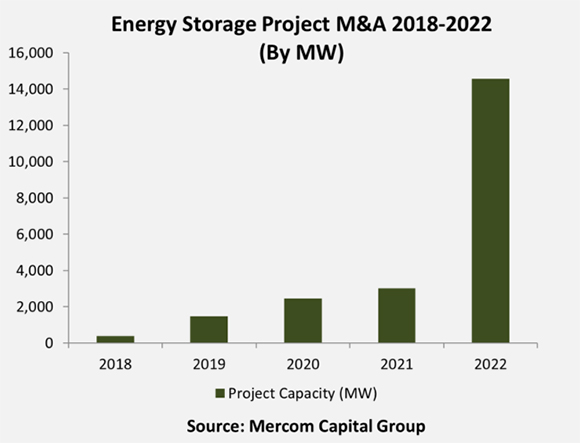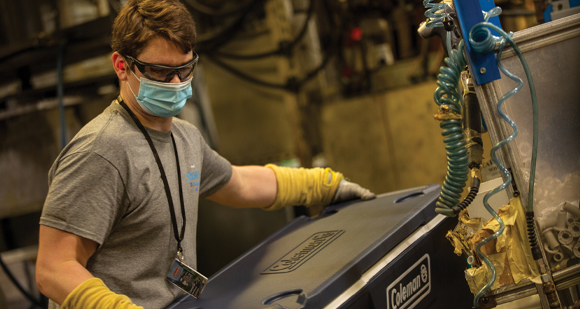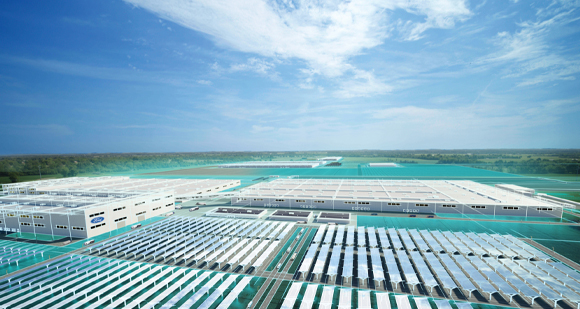|



|
FROM SITE SELECTION
MAGAZINE, JANUARY 2023 ISSUE
|

|
EDITOR’S VIEW
Brookings Institution recently analyzed the federal government’s more
than $77 billion in place-based industrial policy. Editor in Chief Mark
Arend has some thoughts.
|
|

|
INVESTMENT PROFILE: COUNTRY OF GEORGIA
Already known as a crossroads of Europe and Asia, Georgia finds itself
at several promising junctures.
|
|
 
|

|
Graph courtesy of Mercom
|
|
The U.S. Department of Energy in December released county-level data from its 2022 U.S. Energy
and Employment Report (USEER), which tracks the number of jobs
by energy technology and splits the energy technologies into five major
energy sectors: Electric Power Generation; Transmission, Distribution,
and Storage; Fuels; Energy Efficiency; and Motor Vehicles. The full data
sets can be downloaded here. U.S. Secretary of Energy
Jennifer Granholm said the data will help to “pursue more precise
place-based approaches” to policy and investment. “America’s clean
energy transition is not a one-size-fits-all endeavor,” she said. Among
the USEER’s key findings:
- A total of 519 counties have more than 1,000 motor vehicle jobs, and
29 counties have more than 10,000 motor vehicle jobs. “Outside of
the traditional auto manufacturing region of the upper Midwest —
where jobs in motor vehicles continue to expand in Elkhart (IN);
Wayne and Macomb (MI); and Lucas (OH) Counties — the Southeast is
also showing job growth in this sector, with Spartanburg (SC),
Madison (AL), and Hamilton (TN) Counties adding high numbers of
jobs.”
- Energy efficiency — including lighting, HVAC, and insulation — is
the second highest and most distributed source of energy jobs with
382 counties having more than 1,000 jobs.
- In 2021, 69 counties had more than 1,000 solar jobs, and four
counties, all in California, had more than 10,000 solar jobs.
Sixteen counties had more than 1,000 wind jobs.
The announcement noted that recently passed infrastructure legislation
supports transitioning energy communities, investing $750 million for
manufacturing in coal communities and $500 million for clean energy
demonstrations on mine lands.
Separately, Mercom Capital Group, a global clean energy research and
communications firm, just has released its 2022 Funding and M&A report for the energy
storage, smart grid and energy efficiency sectors. Among its findings:
- Corporate funding into energy storage, smart grid and efficiency in
2022 totaled $31.7 billion.
- Corporate funding into energy storage companies reached $26.4
billion in 124 deals in 2022, a 55% increase from the previous year.
- A record 28 energy storage companies were acquired in 2022 — the
most since 2014.
- Smart grid companies raised a record $3.3 billion in 46 deals in
2022.
- VC funding for energy efficiency companies came to $490 million in
nine deals in 2022. — Adam Bruns
|
|
|
KANSAS — THE STATE OF
UNEXPECTED
|

|
ENERGY & UTILITIES
The windswept plains of Kansas harness enough energy to power the
future.
|
|

|
RESHORING
Companies seeking a central U.S. location in which to reshore operations
are finding room to grow and the workers they require in Kansas.
|
|
|
SITE SELECTION
RECOMMENDS
|

|
A rendering of Rivian’s future Georgia manufacturing campus shows a
view of the plant along with “planned greenspaces filled with native
plants” and, presumably, native Georgians walking among them.
Rendering courtesy of Rivian
|
|
John Mozena’s Center for Economic Accountability in December
chose his annual “Worst Economic Development Deal of the
Year.” The “winner”? The Rivian project in Georgia.
Mozena describes the project’s $1.5 billion incentive
package as “a massive, speculative investment of taxpayer
money in an early-stage company in a highly competitive and
government policy-dependent industry without doing basic due
diligence.” Site Selection has covered this project from the outset, including insights from
state officials who beg to differ with skeptics’
conclusions. We interviewed Mozena in May 2022 about
his 2021 Worst Deals of the Year, which in some cases were
Site Selection’s Top Deals of the Year. The Rivian
deal was among our Top Deals of 2021 (not 2022 as Mozena
would have it) since the project was announced in
mid-December of that year — as he would no doubt agree, it’s
all about due diligence. Watch for continuing coverage of
the Rivian project and its impact on the people and places
in the rural outskirts of Greater Atlanta.
|
|
|

|
INDUSTRY PARTNERSHIPS
Before Ford ever broke ground at BlueOval City in Jackson, Tennessee,
the company was working with the Tennessee College of Applied
Technology.
|
|
Ukraine
In December Nestlé announced this investment in a new production site in
Smolyhiv, located in the Volyn region in the western part of Ukraine.
“This investment is aimed at increasing the production of noodles in
Ukraine,” the company said. “This newly announced production site in
Volyn, together with the existing Torchyn factory (Lutsk), will become
Nestlé’s European Regional Hub for Food and Culinary products. The Hub
will employ 1,500 people and supply Ukraine and other European markets.
We are the first large company to announce new investments since the
start of the war in February this year.” To date, the company had
committed 15 million Swiss francs ($16.3 million) in contributions to
the people of Ukraine, as well as keeping in daily contact with its
5,500 employees in the country. Some steps the country has taken include
advanced payment of salaries; one-off payments to support relocation;
job offers to Ukrainian employees in other Nestlé operating companies;
support hubs in neighboring countries such as Poland to welcome
employees and their families who have fled Ukraine; and designation of
the company’s offices in Ukraine as round-the-clock “survival hubs for
our colleagues and their families.”
United Kingdom
London-based Starling Bank in December announced it is creating up to
1,000 new jobs in Manchester as it adds a fourth non-HQ office to its
portfolio of sites that include Southampton, Dublin and Cardiff. The
bank said it is recruiting in the region for roles in operations,
software engineering, data science, cyber ecurity and customer service.
“Starling has selected Manchester for its next base for its deep pool of
tech talent and rich cultural and creative heritage,” the company said.
“The city, which has been named the UK’s Top Digital Tech City, benefits
from a £5 billion digital ecosystem and access to stand-out graduates
from three top universities. The region is home to some of the UK’s
fastest growing start-ups and tech giants, with five tech unicorns based
in the North West and six more pending.” Anne Boden, founder and CEO of
Starling Bank, said, “What better place to set-up shop than in
Manchester? As the world’s first industrial city, with three brilliant
universities on its doorstep and a thriving technology scene, there was
never any doubt that Manchester would house our first step into the
North.” The bank made sure to note that the expansion follows its
investment in women’s soccer in the region — first things first, after
all.
|
|

|
Photo by Miles Holden courtesy of Tourism
New Zealand
|
|
Prime Minister Jacinda Ardern today announced the October date for the
country’s next election and her decision to resign rather than run again
for office. She cited the need for someone “with a full tank.” The
announcement comes as New Zealand reaches the height of its summer
season, tourism is on a post-pandemic upswing and those tourists find
places to refill their tanks. One such place is Ardern’s home region of
Waikato, just south of Auckland, where you can not only tour the
still-intact Hobbiton movie set from the Peter Jackson “Lord of the
Rings” films but also go abseiling (rappelling) in the caves of Waitomo
(pictured).
|
| |

